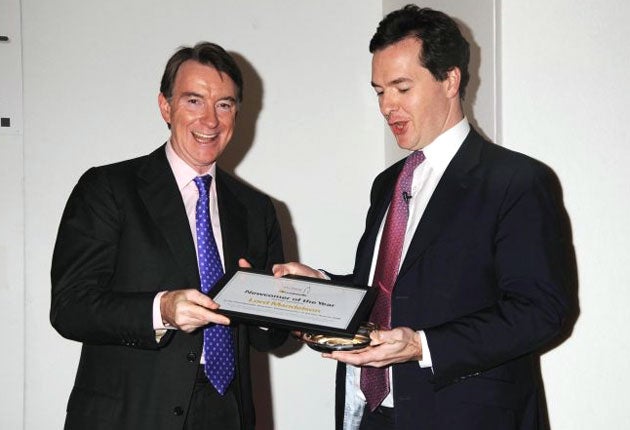David Cameron nearly sacked George Osborne in 2008, new book claims
Osborne landed himself in trouble after leaking private information he learned from Lord Mandelson and also faced claims he improperly solicited donations from Russian oligarch

David Cameron came close to sacking his close friend and political ally George Osborne before the pair even entered Downing Street, a new book claims.
The Conservative party leader, less than two years before the 2010 general election, was advised by some to remove his then shadow chancellor after he leaked details of a private conversation to a newspaper and became embroiled in a damaging row over claims he tried to channel donations to the Tory party from a Russian oligarch – which he strongly denied.
Mr Osborne found himself in trouble after he attended an exclusive party hosted on a £70m yacht by financier Nat Rothschild on the Greek island of Corfu and attended by former Labour Cabinet minister Lord Mandelson, who was shortly brought back into the government by Gordon Brown, and Russian oligarch Oleg Deripaska.

With the outcome of the 2010 general election very much hanging in the balance, Mr Osborne decided it would boost his and Mr Cameron’s chances of winning by leaking damaging information about Mr Brown that Lord Mandelson had told him in private during the party – information that was described as “pure poison”.
Mr Rothschild in turn wrote a letter to The Times accusing Mr Osborne of trying to solicit donations to the Tory party from Mr Deripaska, potentially illegal under UK election law, which Mr Osborne denied.
Mr Cameron initially told colleagues that he thought the episode was “a storm in a teacup” and would soon blow over, according to the book, despite days of front page headlines.
In private conversations Mr Cameron hinted he was prepared to sack Mr Osborne if it was “absolutely necessary,” according to a biography on the Prime Minister, Call Me Dave, co-authored co-authored by the former deputy chairman of the Tory party Lord Ashcroft and journalist Isabel Oakeshott.
But he soon came under pressure to sack Mr Osborne, sources told the authors. A source said it was “very touch and go” for Mr Osborne, who was described as “uncharacteristically subdued” for some time after the media storm.
Responding to the claims, Mr Osborne said he would not “dignify” the book with a response. Downing Street has reacted to claims in the book in the same way.
Join our commenting forum
Join thought-provoking conversations, follow other Independent readers and see their replies
Comments
Bookmark popover
Removed from bookmarks